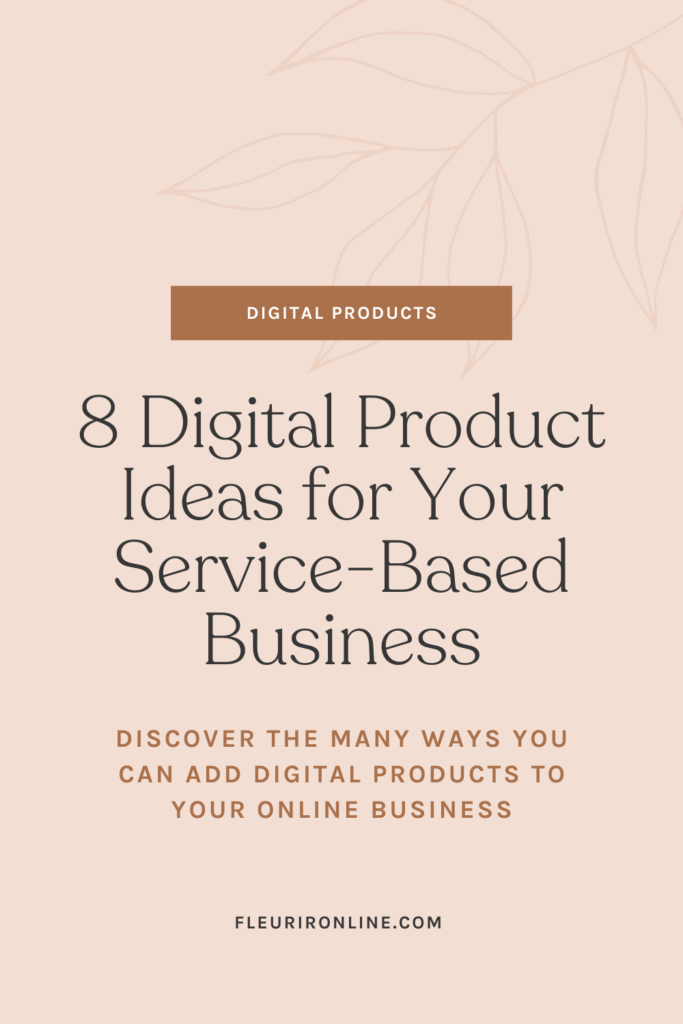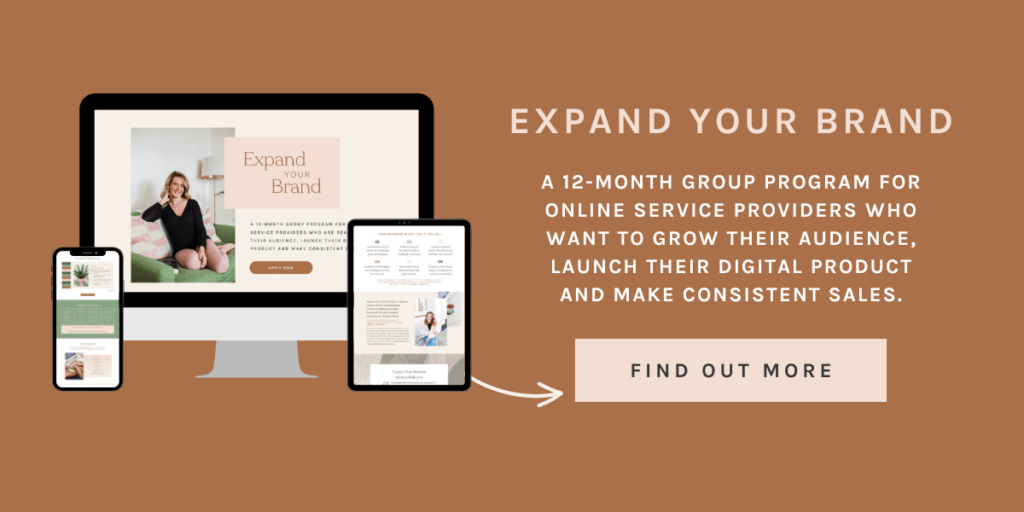This is the second in a series of 10 podcast episodes/blog posts all about digital products. Check out the other posts in this series below.
1. How to Create Digital Products That People Actually Want
2. 8 Digital Product Ideas for Your Service-Based Business
3. When is the Right Time to Create Digital Products?
4. How to Find the Time to Create Digital Products
5. 5 Ways to Validate Your Idea for Your Digital Product
6. 5 Limiting Beliefs Keeping You From Creating Your Digital Product
7. The Tools You Need to Sell Digital Products
8. Digital Products vs Courses – Which Should You Create?
9. Your Digital Product Launch Questions Answered
10. Digital Products Not Selling? Here’s What to do
In the second episode of the series, I share with you 8 digital product ideas for your service-based business along with examples for each of them.

Listen to this episode
Listen to this episode and subscribe using your favourite podcast app!
Apple Podcasts | Spotify
1. Templates
Let’s kick it off with the first one, templates. Templates are a really easy, quick way to get started with digital products as more often than not, you can look inside of your own business and turn those things into templates. Templates are also great because they provide your customers with the ability to implement quickly. You are saving them time by creating something that they can take and modify for use in their own business rather than having to come up with something from scratch.
Let’s look at some examples for different industries. If you’re a copywriter then you may have a specific format that you follow when you’re writing website copy or email sequences. You can turn these into templates to help businesses who are not yet at the stage where they are ready to invest in a copywriter to do it for them. Social media managers may have graphic or caption templates that they use when creating posts for their clients – turn these into templates that you can sell. Brand strategists likely use a base template when delivering brand strategy presentations to clients. This is a great product to sell to other brand designers who want to include brand strategy in their services.
There are some exceptions for example with website templates which are going to take longer to create but even with website templates, its likely that you can use aspects of web designs that you have created for clients and turn these into templates. This is the same for branding designers. Take a look at what logo and branding concepts haven’t made it to approval stage and think about how you can turn these into branding kits for people to purchase.
2. Ebooks
Ebooks are another great digital product to get started with, especially if you want to share your knowledge but don’t feel quite ready to do so via an online course.
Ebooks are relatively simple to produce since all they need is written text and images and even if you’re not a designer, you can purchase a template for your ebook and use that as your foundation for creating it.
They are also really easy to distribute either via online marketplaces or your own website. All you need is a way to take payment (I personally love and recommend ThriveCart), a method for delivering your ebook (ie your email system and for this I always recommend MailerLite) and a place to store your ebook which can be via Dropbox or Google Drive.
Ebooks are also easy to be consumed by customers who can read them on their computers, tablets and mobile phones.
The great thing about ebooks is that you are able to create a written step-by-step guide for what you do and easily share this with others.
They are also a great way to gauge interest for a particular topic before creating something larger like a course. You can then use the ebook you’ve created as part of a funnel so it doesn’t go to waste.
I think ebooks work well for all industries for example, a Pinterest manager could write an ebook on how to get started with Pinterest. The ebook could include a complete step by step guide to Pinterest from setting up and optimising their profile to creating a strategy for the platform. A copywriter could create an ebook on how to write website copy. The options for ebooks are endless.
3. Workbooks
Worbooks are similar to ebooks but whereas ebooks typically contain a lot of information, workbooks are more interactive and provide prompts to help people gain clarity or find answers about a particular topic.
For example, the first digital product I ever created was a workbook on how to build a brand. It’s a 50 page workbook that provides questions for those at the beginning of building a business to help them build their brand. In the workbook, I cover everything from goals to ideal clients to marketing. It’s a comprehensive workbook that I still use now inside one of my email funnels and many of my customers for other digital products and services have purchased the workbook first.
At the time of recording this series, I am working on creating my second workbook to help business owners get started with digital products. The idea behind this workbook is that it will support business owners in strategising how to add digital products to their business model.
4. Masterclasses
A masterclass is usually a 45-90 minute presentation recorded over slides. Again like the other options available, masterclasses should be focused on a specific niched-down topic with actionable steps for your customer to implement.
The great thing about masterclasses is that you can deliver them live but also have the recording available for purchase.
One of my clients ran a workshop at the beginning of our time working together and wasn’t quite sure what to then do next with it. So we turned it into a low-ticket offer funnel which is now offsetting her advertising spend and building an email list of warm subscribers.
Another option with masterclasses is that you can ‘take them on the road’ and deliver them to other peoples audiences. For example, my client who is a copywriter could partner with brand and web designers who share a similar audience and deliver the workshop to them. This is known as joint venture webinars.
5. Course
The next digital product I’m going to talk about is one that isn’t as quick to create as the other products I’ve mentioned so far and that’s a course. Courses are an amazing way to share your expertise with others who are wanting to learn from you, however, they definitely aren’t for the faint hearted because they require a lot of work upfront.
With something like ebooks when your content is written down for your audience to download in a simple PDF, a course takes a lot more thought and effort to put together. You need to think about creating the outline, scripting out the content, designing the slides, recording the videos and then putting everything together in your course platform ready to sell.
There’s no rule on how long courses need to be but they tend to be anything from 4 – 10 modules with 3-5 lessons per module so as you can see, that’s a lot of content to create.
You can literally create a course about anything as long as it’s something that you know is going to help solve your ideal clients need.
6. Mini-course
Whilst we are on the subject of courses, another digital product idea for you are mini-courses. I personally love mini-courses as they can be a really great way to validate your idea for a larger course.
With mini-courses you would take a portion of your signature process or framework and turn it into a course. For example, I have a mini course focused around creating your first digital product and how to build it into a simple sales funnel. This course is the perfect first step into digital products and is a perfect lead into my program, Expand Your Brand.
Let’s say you’re a social media manager who specialises in Instagram. You may have plans to create a larger course around Instagram as a whole but in the meantime, you could create a mini-course teaching business owners how to use Reels as part of their strategy.
7. Membership
For number seven on the list of digital product ideas we have memberships. Typically in the online space a membership is a business model where your customers pay a recurring amount to have access to specific content.
Whilst none of the digital products I mention in this episode are a truly passive option, I would say that out of all of them, memberships are the most time-consuming. I actually started my own membership back in May of 2020 and shut it down 12 months later as I didn’t realise until I was doing it how much time and energy it actually takes to run a membership. In fact, I’d recommend only going down the membership route if you have at the very least a day a week to spend working solely on your membership.
I actually really love the membership model and I would love to have a membership again but right now for where I’m at in my business and the level of support I want to provide for my clients, the membership model isn’t for me.
Some examples of membership models are stock photography subscriptions which are perfect for photographers looking for a way to expand their impact and income or Canva templates which are great for social media managers or designers. Your membership could be more content focused and structured a bit more like a course for example if you’re a Facebook Ads Manager, you may have a membership that helps people with setting up their own Facebook Ads for their business. Memberships are great for businesses who are in industries that change frequently which is why social media is a perfect example as you can easily keep your members up to date with the latest changes.
8. Group Programs
The last digital product idea I want to talk about today are group programs. I personally love group programs and feel they are a perfect blend of education and support. Group programs can vary in how they are structured but typically they are set over a period of time whether that’s six weeks or six months and they include either live teachings or a course and group support in the way of a community and calls.
Something that I absolutely love within my own business is supporting my clients as closely as possible and providing them with the accountability and guidance that they need. This is exactly why I created Expand Your Brand.
It started life originally as a mastermind in 2021 after I became booked out with 1:1 clients in the space of about two weeks. I knew that there were business owners out there who wanted to expand their business into digital products but they just needed someone alongside them to provide support, guidance and accountability. The format has since changed and Expand Your Brand 2.0 which is available to join at any time is now a group program with a course element to it.
Group programs can work for any business. I once worked with a brand designer who launched a group program for businesses that wanted to become the no-brainer choice for their customers. The program supported them in doing this through a mix of strategy and design. It was a well-received program and her first intake was 16 students. I have also worked with a copywriter who has launched a 6-month program for business owners to take charge of their copywriting and write with confidence. It’s perfect for those who aren’t yet ready to invest in hiring a copywriter. She had 8 sign-ups for her first round.
These are just 8 digital product ideas that you can build into your service-based business but this is by no means all of them. There are so many ways that you can expand your impact and income with digital products, it’s about finding the right product that will work for you and your ideal clients.
Be sure to check out the other posts in this series. Here’s a reminder of them again.
1. How to Create Digital Products That People Actually Want
2. 8 Digital Product Ideas for Your Service-Based Business
3. When is the Right Time to Create Digital Products?
4. How to Find the Time to Create Digital Products
5. 5 Ways to Validate Your Idea for Your Digital Product
6. 5 Limiting Beliefs Keeping You From Creating Your Digital Product
7. The Tools You Need to Sell Digital Products
8. Digital Products vs Courses – Which Should You Create?
9. Your Digital Product Launch Questions Answered
10. Digital Products Not Selling? Here’s What to do
If you’re looking for support, accountability and guidance in building digital products into your business, be sure to check out Expand Your Brand, my 12-month high-touch group program for online service providers who want to grow their audience, launch their digital product and make consistent sales.




